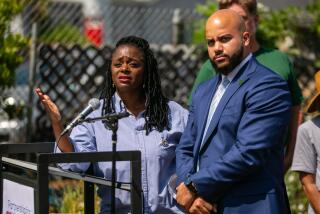Jesse Jackson Urges Voters to Fight ‘Three Strikes’ Law
- Share via
The Rev. Jesse Jackson on Monday urged a multicultural gathering to register to vote as a potent response to the state’s “three strikes law,” noting that jury pools are drawn from registered voter lists and that only voters can elect politicians willing to change the law.
Delivering the keynote address at a conference devoted to the broad impact of the 2-year-old law, Jackson called it an “expensive non-remedy.”
“Let’s have a massive voter registration drive as a way to fight back,” he said. Such a drive would be part of what he called “a resistance movement to change the unjust laws and the national attitude to lock up rather than lift up.”
Jackson’s remarks marked the latest in a series of speeches he has made in recent weeks as part of a statewide campaign against the three strikes law, which mandates a prison term of 25 years to life for people convicted of a third felony.
The campaign was launched in March on the steps of the downtown Criminal Courts Building, when Jackson appeared with Los Angeles County Public Defender Michael Judge and called the three strikes law unjust.
Jackson said then that he planned to meet with prosecutors and prominent defense attorneys in San Francisco and Los Angeles, and then convene a conference in Los Angeles to call attention to criminal justice issues.
The conference, dubbed “The Faces of Three Strikes,” drew about 100 people Monday to Holman United Methodist Church. There, Jackson said of the three strikes law: “It’s immoral. It costs too much. Thirdly, it’s not a solution.”
He proposed curbing crime, especially drug-related offenses, with “interdiction, education, jobs, treatment and jails as a last resort.”
Such a strategy, he said, would require a “massive awakening” to the comparative costs and benefits of the three strikes last and a groundswell of new voters convinced that the law is not worth it.
“Every high school senior coming across that graduation stage this month . . . should have a diploma in one hand and a voter card in the other,” Jackson said.
Other speakers, however, voiced concern that the law--endorsed by a solid majority of California voters in the November 1994, elections--is here to stay.
“We’re stuck with this thing,” said attorney Walter L. Gordon III. “It’s the reality. It’s sad.”
More to Read
Get the L.A. Times Politics newsletter
Deeply reported insights into legislation, politics and policy from Sacramento, Washington and beyond. In your inbox twice per week.
You may occasionally receive promotional content from the Los Angeles Times.










